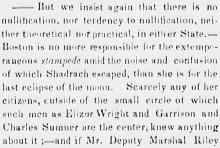The Fugitive Slave Case in Boston.
An extraordinary amount of latent patriotism, it appears to us, has been liberated by this simple case. We are awaiting with some impatience to hear from the South on the subject; and, in the mean time, congratulate that respectable but somewhat excitable section of the confederacy on "something having turned up," at last, which will diver their indignation, for a time at least, from the misdeeds of poor little Vermont! Theoretical "nullification in Vermont," they will think, is not so bad as practical nullification in Massachusetts.
––––––But we insist again that there is no nullification, nor tendency to nullification, neither theoretical nor practical, in either State.––Boston is no more responsible for the extemporaneous stampede and noise and confusion of which Shadrach escaped, than she is for the last eclipse of the moon. Scarcely any of her citizens, outside of the small circle of which such men as Elizur Wright and Garrison and Charles Sumner are the center, knew anything about it;––and if Mr. Deputy Marshal Riley and not been scared half out of his senses and got behind the door, Shadrach would not have escaped. We still bet a "Silver Gray" against a "woolly head" that if Marshal Turkey had had Shadrach in charge he would not have been "rescued." The whole affair arose from most ridiculous mismanagement on the part of the U.S. Officer, and is wholly unworthy of the imposing and solemn Proclamation by the President of the United States which it has called forth. There is no State in the Union where resistance to the Law is less likely to be tolerated for a moment than in Massachusetts––and no City in the Union where Law will be longer obeyed and upheld (however odious or oppressive it may be deemed) than Boston. The President and Secretary of State either know this or else they have so lively an appreciation of the extreme odiousness of the Fugitive Slave Law at the North that they dare not argue form their knowledge of the character and history of the people of New England. The prompt arrest of those supposed to be aiding and abetting the escape of Shadrach––the prompt and explicit action of the City Authorities of Boston––and the prompt expression of public condemnation of anything like lawlessness––(all before the promulgation of the Proclamation)––show conclusively where New England people stand in the premises––law-respecting, law-loving, law-abiding. Such a people DO NOT NEED to be informed of their duty by Executive Proclamation! Such instrumentalities are better adapted to the ungovernable impulses of a more Southern latitude.
"The Fugitive Slave Case in Boston,"Burlington (VT) Weekly Free Press, February 28, 1851, p. 2

